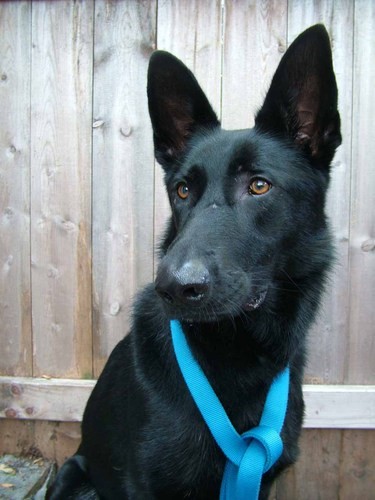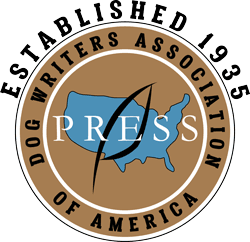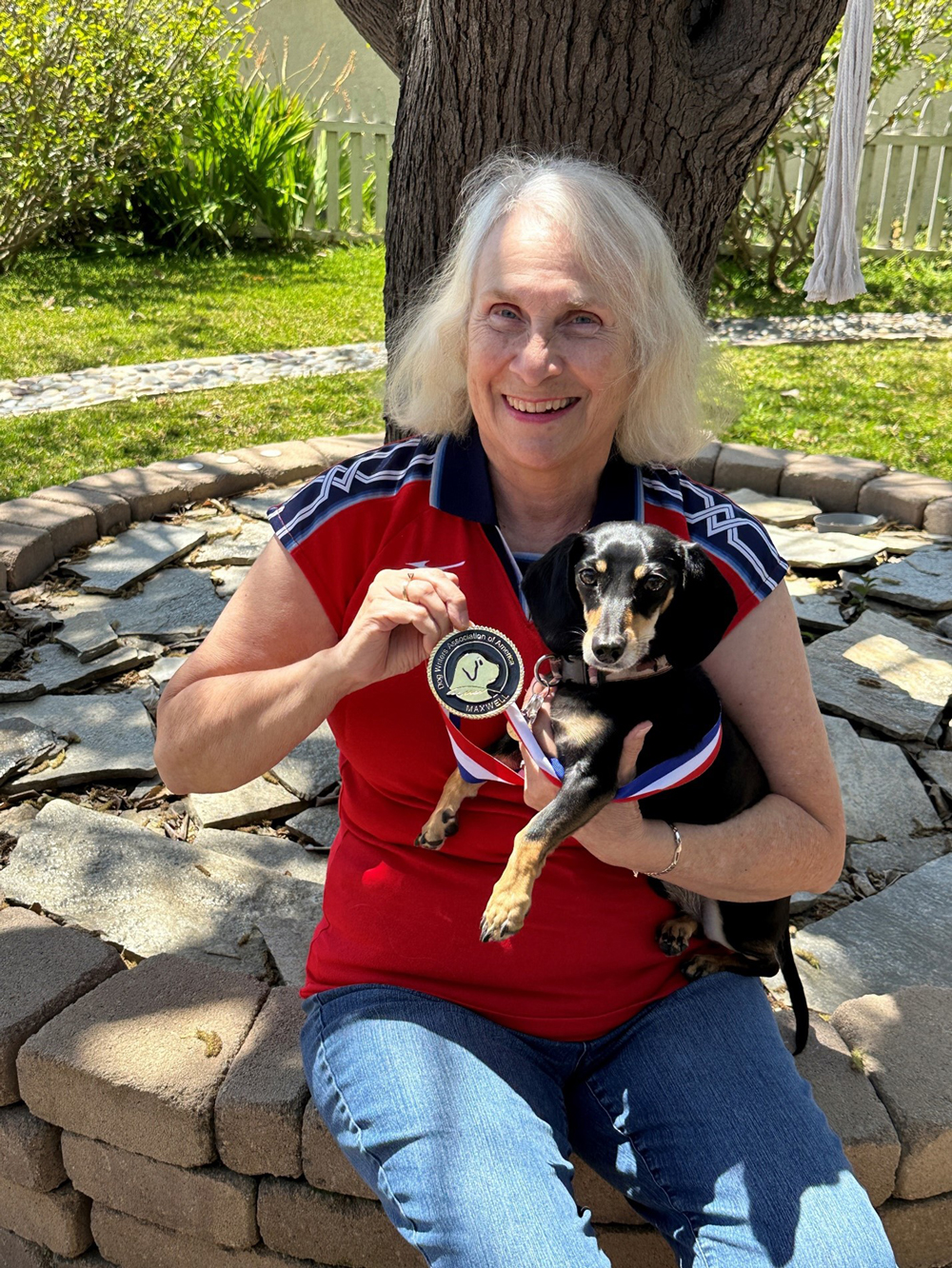Anne Marie Duquette is the winner of the 2023 DWAA Writers Contest in the “Canine or All Animal Newsletters” category with “The Four-Legged Wedding Present,” and a member of the Writers Guild of America.
Congratulations on your win! Tell us about your experience and expertise, and how this relates to your entry. What target audience did you write for, and why?
I’ve been companions with canines for 50 years. Two of them were my mobility service dogs as I’m a disabled veteran, and I’ve had others as pets. Since 1988, I’ve worked at home as a professional writer, so I can honestly say I’ve spent all my adult life with dogs inside the house and out. I wanted to share this lifestyle and how it influenced my family; especially my two children and spouse.
What prompted you to submit this specific entry? Why do you think it struck a special chord with the public and the judges—and with you?
My husband was a career military man serving 26 years in the Navy. Many people assume dogs were a burden to our nomadic life. I wanted readers to know this isn’t true! Despite the circumstances, there ARE ways to “make it work” if you love animals, and your partner loves you. I believe that’s why my story stood out. True love does conquer all.
I plan to sponsor an award for next year’s writing contest promoting, “Nomads and Their Dogs.” Sadly, I’ve seen too many pets left behind from relocating military personnel or civilians. Either take your dog with you, or don’t get one in the first place!
How big a part have dogs played in your personal and professional life? Was there a particular dog that sparked your interest in interacting with the public? Tell us about this special dog, and/or the dogs in your contest entry.
The special dog in my story was my very first dog, a rescued Irish Setter named Brandy. He ignited my rabid “animal lover genes.” Soon after came more dogs and horses and a cat and birds and guinea pigs and rabbits and chinchillas. We weren’t/aren’t a wealthy family, or farmers with land. We were Navy. But I loved animals so much, with dogs heading the top of the list.
When my beloved Brandy died of old age—before heroically catching a wanted murderer hiding in my house!—I vowed to never be dogless again. For 26 years we moved to new duty stations with two cars full of children and animals, a horse transport following. I would never leave my four-legged companions behind. They were, and always will be, family.
How big a part have people played in your association with dogs? Family? Friends? Do you have any favorite writers/bloggers/media or graphic artists? How have they influenced your career?
My husband played a huge part in my “doggie lifestyle.” The best couples are those who both love animals. Mismatches, i.e. “It’s me or the dog,” ultimatums are traumatic, especially if couples are already in a committed relationship. Someone out of the three is going to get the short end of the stick—usually the poor dog.
While still engaged, I made certain my guy loved dogs before heading to the altar. I asked for a dog for my wedding present, and his vow that we would never be separated. That’s a hard thing to ask of a Navy man who could be stationed anywhere in the world. But he kept his promise by staying stateside. I do so love him for that.
Also, the editor of 20 of my 25 published books is a dog lover/owner too. She and I meshed instantly, and she always roots for my dog characters.
When you consider both your personal and professional canine-related achievements, which stands out the most?
My greatest personal joy is watching the dogs I’ve rescued—some of them with terrible pasts—bloom. The most abused dog I ever rescued had been dumped in a Walmart parking lot during a rescue group adoption event. We immediately took her home, not to foster, but to adopt that very day. All-black German Shepherd “Queen of Sheba” came into my life terrified, bleeding, scarred, skeletal, and infested with fleas and parasites. My heart broke as she passed tree bark and twigs in her stools for the next three days—the diet of a starving dog.
She was so young, so traumatized, so beaten down. I was positive Sheba was emotionally damaged for life. I was wrong! She copied my first mobility service dog so well that when I retired him a year later, she soon stepped into his footsteps.
Head held high, she now had confidence, a purpose in life, and a joyful job with the person she adored—me. Queen of Sheba spurred me into professionally helping GSD rescue groups with a book signing and donations. Canines like her are the driving force that spark my professional life. Of all the dogs I’ve loved, Sheba is and always will be my shining star. Her only fault was letting old age separate us. It’s been eight years and I still miss her terribly. That crack in my heart will never go away.
What ongoing or future canine projects do you have planned?
I am in the process of writing my 4th fiction book in a series about suicidal people who have happy endings, thanks to their dogs. I am not writing about Emotional Support Animals, but pet dogs. PTS issues (no longer called PTSD) with fictional ex-military heroes and their ESAs have been well covered, but there are other issues to be addressed.
Due to genetics, mental illness often runs in families. And suicidal children are not a rarity. Those suffering from non-wartime trauma (like domestic or sexual abuse) can greatly benefit from the companionship of a pet. They can be as effective as any certified ESA.
The public often believes that professionally trained ESAs are the way to go—but they aren’t free. Unless you are a disabled veteran, they can cost anywhere from five to ten thousand dollars. (Hence the abundance of untrained “fake” support dogs wearing internet-ordered blue vests.) But pets can do the job, too. I write engrossing fiction with a happy ending, and the message that people can greatly benefit from the companionship of a beloved dog on their journey to mental wellness.
This was my case. Despite regular counseling and meds for bouts of clinical depression, some days caring for my three dogs were the only things that got me out of bed. “Fur therapy” is a cause dear to my heart, especially as my family has had three suicides in four generations, along with others who were/are genetically predisposed and diagnosed with mental illness.
Unlike my previous traditional publisher, I plan to self-publish these books, and am presently researching that process.
What would you recommend to those peers who wish to enter your winning category in next year’s contest?
That’s a tough one, as everyone comes from different places. Here’s my take. I’ve read many, many stories about “one human–one dog” relationships. But I added my husband to make that a trio, then added my children to expand the umbrella. I decided a story with more than a one-on-one relationship would appeal. And it did!
Sadly for my animal loving husband, who starred in my story, all our dogs have, with one exception, latched onto me. During the 46 years of our marriage, I’ve been the “dog magnet” and he is always second best, which wounds his tender heart. We all know dog magnets exist, and so do the dogs who worship them. I can’t explain this phenomenon. Who can? Strangely enough, the only dog who loved him best was my first service dog! Perhaps I’ll write about that oddity someday…
To conclude this interview, what final thoughts would you like to share?
I believe that dedicated breeders and rescuers share equal footing, and we are all entitled to choose our canine companions from either category without being judged, especially those who bypass rescue organizations.
I find it unreasonable that the public expects all of us to participate in rescue efforts. Yes, this is a great cause. God bless those special people who do. But others have valuable skills to offer our canine world, and rescuing is but ONE option. To not acknowledge this is unjust.
Should canine research scientists quit their jobs and work at local shelters? Should flyball teams forgo the camaraderie of their canine and human companions to head up fundraising organizations? Should AKC kennels walk away from furthering the health and vitality of our breeds?
Cherishing beloved four-legged family members does not come with strings attached to anyone outside the family circle. Pure joy between loving canine-human pairs is enough! Anything beyond that is a private decision. Nor may it even be possible. Just look at the unsheltered (homeless) and their precious dogs. The unsheltered may be skinny, but the dogs never are.
To those finger-pointing but compassionate souls who are heartbroken (as am I) about abused and abandoned animals, please understand the big picture. We CANNOT save them all. Despite donations of time and money, we can only save SOME.
I do try. I’ve had dogs for 50 years. My first service dog Striker was an AKC GSD with impeccable lines, as were two other GSDs. So was one of my three dachshunds. My other rescues were dice rolls. Some blossomed wonderfully. Others I could only tend and love, getting very little in return. Puppies from reputable breeders don’t come with old baggage and headaches. Ask the police or military or search and rescue and service dog organizations that patronize them.
But for those generous gambling souls who rescue, your reward could be something precious beyond your wildest dreams--like my beautiful Queen of Sheba. She was a triumphant phoenix who rose to soar high and humbled me with her courage. Together we shared one of the most joyous periods in my life. May you all find a Sheba of your own someday.
So, to breeders and rescuers and contest winners, happy trails, tales, and tails. I salute you all.
Congratulations again and thank you for sharing with us.

A member of the Writers Guild of America for her sale to Paramount Studios, Anne Marie Duquette has published 25 books, 20 of them for Harlequin Romance. Her credits website is PaperBackGems.com, and her website with free dog short stories as a thank you to her readers can be found at Minigems.net.
She would like to acknowledge the no-kill “Coastal German Shepherd Rescue” in Lake Forest, California. They save those that others deem disposable. Sheba was one of them.

